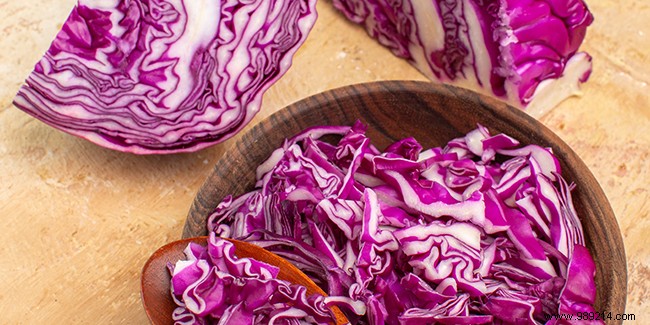
Red cabbage is a very popular vegetable to be eaten raw in salads, but also cooked or in sauerkraut when it is fermented. It is part of the Brassicaceae (formerly cruciferous) family and its name is Brassica oleracea . Red cabbage originates from Central Europe. In addition to its subtle taste, it contains a large number of nutrients that give it medicinal properties.
Red cabbage is a herbaceous plant that can be stored for up to three weeks in a cool room. The high season for consuming it runs from January to March. With a slightly sweet flavor, red cabbage contains many vitamins and as many minerals. This food contributes to the proper functioning of our body. Regular consumption of red cabbage helps to replenish energy.
Nutritional value of red cabbage per 100 grams:
Red cabbage contains lesser amounts of selenium, sodium, zinc, vitamins E, K1, B1, B2, B3, B5, B6 and B9 as well as beta-carotenes, manganese, iodine, iron , chloride, lipids, carbohydrates, proteins and water.
Red cabbage is very rich in dietary fiber and helps stimulate intestinal transit. Thanks to antioxidants, it would also help reduce the risk of certain cancers. Red cabbage can still be integrated into a diet aimed at weight loss, as it contains 36.5 kcal per 100 g.
Thanks to the vitamin C it contains, red cabbage is excellent for the skin and especially for its healing in small wounds. It promotes immune functions and helps fight skin aging caused by free radicals.
Consuming red cabbage is strongly recommended for small digestive tract problems. Thus, it helps regulate intestinal transit, helps calm heartburn, nausea, hiatal hernias, hepatobiliary dyspepsia and other mild ailments of bowel and stomach conditions.
Red cabbage contains a lot of calcium which contributes to good bone and muscle health, as well as that of blood pressure. It is still rich in mineral salts and vitamins to help fight anemia. Vitamin K thus helps thin the blood and potassium helps prevent cardiovascular disease. Its hypoglycemic principle is still beneficial for people with diabetes. Red cabbage also contains a sap which is an excellent vermifuge against roundworms and pinworms.
Red cabbage can also be used externally. Thus, it is possible to apply raw cabbage leaves as a poultice. They help to promote the healing of small wounds, but also to relieve rheumatism and muscle pain. Raw cabbage leaves can still be placed on the forehead against headaches and in certain opportune places during sciatica or inflamed joints. As a poultice, it is therefore advisable to keep it on the skin for as long as possible, and even overnight if possible for rheumatic pain.
Red cabbage can be eaten raw or cooked. Raw, it retains all its properties. When it cooks, you have to be careful, because if it smells sulphurous, it means it has cooked for too long. There is no lack of recipes to integrate it into the diet and as regularly as possible in order to often take advantage of all its virtues, especially in winter to fill up with vitamins and fight against external pathogens.
Red cabbage is not recommended for people on anticoagulant treatment because of the vitamin K it contains. The maximum amount for other people is recommended at 250 g maximum in a day. In any case, it is better to talk to your doctor about it when you are taking anticoagulant treatment. People with irritable bowel syndrome may have cabbage intolerance in general. Red cabbage can be gradually integrated into consumption provided that symptoms such as bloating, abdominal pain and diarrhea are greatly reduced. People affected by this disease should talk to their doctor or also to a nutritionist. Cabbage in all its forms may still be subject to a decrease in the effect of certain medications such as painkillers containing acetaminophen. This should therefore be taken into account when taking any of these drugs.